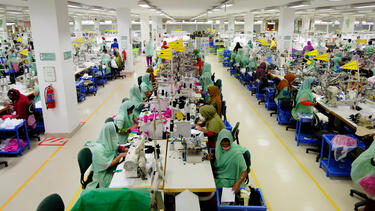Global Business
Better Sanctions Can Weaken Russia
Yale SOM’s Jeffrey Sonnenfeld, who has helped lead the movement to isolate Russia, and co-author Steven Tian write that the current sanctions regime is spottily enforced and ignores key commodities exports. They suggest three steps policymakers should take to give economic sanctions real bite.

How important is the illicit economy?
Moises Naim, editor of Foreign Policy, has spent more than a decade studying the illicit economy that moves everything from drugs and guns to pirated movies and human body parts around the world. In the book, Illicit, he outlines what amount to a shadow system of global business and trade.
What's next for globalization?
As the companies that were once the suppliers to multinationals have grown into multinationals themselves, competitors can suddenly come from anywhere, according to Hal Sirkin, senior partner and managing director at the Boston Consulting Group and co-author of the book Globality. He describes how to compete in the new era of globalization.
Is China the new global star?
Deborah S. Davis, a China expert and professor of sociology at Yale, discusses a wide range of issues regarding China and globalization—from the nation's growing economic power to its role in addressing worldwide environmental problems.
Where does Africa fit in the globalization puzzle?
The continent has often been singled out as an exception to the story of increasing globalization. Todd Moss, an Africa expert with the Center for Global Development, discusses Africa’s integration in world markets, why trade between African countries is so hard, and the role of outside powers such as China.
How has trade shaped the world?
Moving goods around the globe is such an everyday phenomenon that it has become almost invisible. But the business, policy, technology, and politics of trade have been powerful forces throughout history. William J. Bernstein, author of A Splendid Exchange: How Trade Shaped the World, talked with Qn about both the sweep and the intricacies of the endeavor through history.
What's the lesson of Iceland's collapse?
Iceland may have been a forerunner of 21st century financial trends. First it profited from increasing integration with the global financial system. Then ties to the world economy helped pull it into fiscal ruin. What can an island with less than .005% of the world’s population teach us about globalization?
How Has Globalization Benefited the Poor?
The lives of people in distant countries are increasingly being linked, through commerce, communications technology, or culture. Researchers are trying to parse out how the gains from globalization are touching the lives of the poorest citizens in developing countries.

Can you say 'Cosmo' in Russian?
You can find Cosmopolitan on newsstands in Korea, India, Russia, Greece, Brazil, China, and 50 other countries. How did the idea of the “fun, fearless female” go global — and pull in profits for Hearst?
What can values do for globalization?
Can globalization thrive without a strong foundation of moral and social values? Former British Prime Minister Tony Blair argues that all human systems rely on certain fundamental values to function well over the long term, and that applying this understanding to globalization could produce tangible benefits.
Do we need a global regulator?
One problem that has come up throughout this issue is how to enforce fair rules throughout a global system when most enforcement mechanisms are nation-based. Given how powerful the forces of globalization are, do we need a new global regulator?